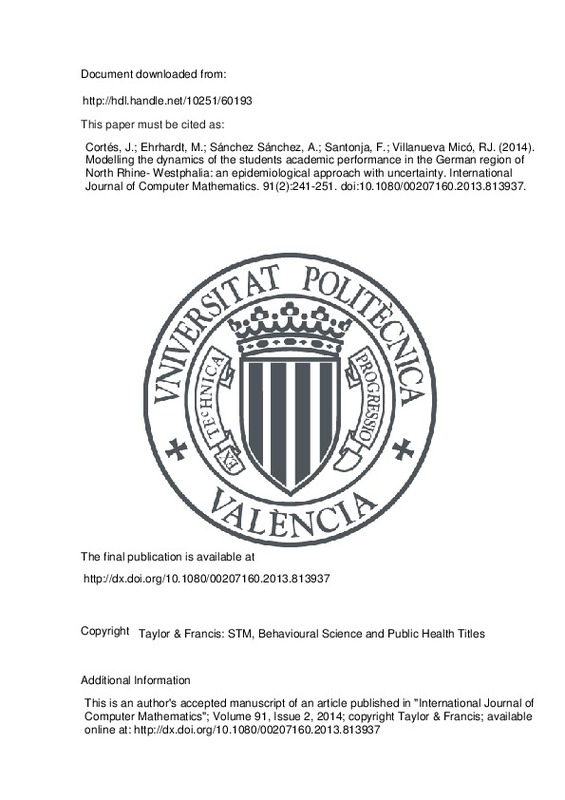JavaScript is disabled for your browser. Some features of this site may not work without it.
Buscar en RiuNet
Listar
Mi cuenta
Estadísticas
Ayuda RiuNet
Admin. UPV
Modelling the dynamics of the students academic performance in the German region of North Rhine- Westphalia: an epidemiological approach with uncertainty
Mostrar el registro sencillo del ítem
Ficheros en el ítem
| dc.contributor.author | Cortés, J.-C.
|
es_ES |
| dc.contributor.author | Ehrhardt, Matthias
|
es_ES |
| dc.contributor.author | Sánchez Sánchez, A.
|
es_ES |
| dc.contributor.author | Santonja, F.
|
es_ES |
| dc.contributor.author | Villanueva Micó, Rafael Jacinto
|
es_ES |
| dc.date.accessioned | 2016-01-26T15:24:38Z | |
| dc.date.available | 2016-01-26T15:24:38Z | |
| dc.date.issued | 2014 | |
| dc.identifier.issn | 0020-7160 | |
| dc.identifier.uri | http://hdl.handle.net/10251/60193 | |
| dc.description | This is an author's accepted manuscript of an article published in "International Journal of Computer Mathematics"; Volume 91, Issue 2, 2014; copyright Taylor & Francis; available online at: http://dx.doi.org/10.1080/00207160.2013.813937 | es_ES |
| dc.description.abstract | Student academic underachievement is a concern of paramount importance in Europe, where around 15% of the students in the last high school courses do not achieve the minimum knowledge academic requirement. In this paper, we propose a model based on a system of differential equations to study the dynamics of the students academic performance in the German region of North Rhine-Westphalia. This approach is supported by the idea that both, good and bad study habits, are a mixture of personal decisions and influence of classmates. This model allows us to forecast the student academic performance by means of confidence intervals over the next few years. | es_ES |
| dc.description.sponsorship | This work has been partially supported by the Spanish Ministry of Economy and Competitiveness grant MTM2009-08587 and Universitat Politecnica de Valencia grant PAID06-11-2070. | en_EN |
| dc.language | Inglés | es_ES |
| dc.publisher | Taylor & Francis: STM, Behavioural Science and Public Health Titles | es_ES |
| dc.relation.ispartof | International Journal of Computer Mathematics | es_ES |
| dc.rights | Reserva de todos los derechos | es_ES |
| dc.subject | Student Academic Performance | es_ES |
| dc.subject | Modelling | es_ES |
| dc.subject | Non-linear System of Differential Equations | es_ES |
| dc.subject | Forecasting in Social Sciences | es_ES |
| dc.subject | Bootstrap Confidence Intervals. | es_ES |
| dc.subject.classification | MATEMATICA APLICADA | es_ES |
| dc.title | Modelling the dynamics of the students academic performance in the German region of North Rhine- Westphalia: an epidemiological approach with uncertainty | es_ES |
| dc.type | Artículo | es_ES |
| dc.identifier.doi | 10.1080/00207160.2013.813937 | |
| dc.relation.projectID | info:eu-repo/grantAgreement/MICINN//MTM2009-08587/ES/Ecuaciones Diferenciales Aleatorias Y Aplicaciones/ | es_ES |
| dc.relation.projectID | info:eu-repo/grantAgreement/UPV//PAID-06-11-2070/ | es_ES |
| dc.rights.accessRights | Abierto | es_ES |
| dc.contributor.affiliation | Universitat Politècnica de València. Departamento de Matemática Aplicada - Departament de Matemàtica Aplicada | es_ES |
| dc.description.bibliographicCitation | Cortés, J.; Ehrhardt, M.; Sánchez Sánchez, A.; Santonja, F.; Villanueva Micó, RJ. (2014). Modelling the dynamics of the students academic performance in the German region of North Rhine- Westphalia: an epidemiological approach with uncertainty. International Journal of Computer Mathematics. 91(2):241-251. https://doi.org/10.1080/00207160.2013.813937 | es_ES |
| dc.description.accrualMethod | S | es_ES |
| dc.relation.publisherversion | http://dx.doi.org/10.1080/00207160.2013.813937 | es_ES |
| dc.description.upvformatpinicio | 241 | es_ES |
| dc.description.upvformatpfin | 251 | es_ES |
| dc.type.version | info:eu-repo/semantics/publishedVersion | es_ES |
| dc.description.volume | 91 | es_ES |
| dc.description.issue | 2 | es_ES |
| dc.relation.senia | 251636 | es_ES |
| dc.identifier.eissn | 1029-0265 | |
| dc.contributor.funder | Ministerio de Ciencia e Innovación | es_ES |
| dc.contributor.funder | Universitat Politècnica de València | es_ES |
| dc.description.references | Akaike, H. (1969). Fitting autoregressive models for prediction. Annals of the Institute of Statistical Mathematics, 21(1), 243-247. doi:10.1007/bf02532251 | es_ES |
| dc.description.references | Brockwell, P. J., & Davis, R. A. (1996). Introduction to Time Series and Forecasting. Springer Texts in Statistics. doi:10.1007/978-1-4757-2526-1 | es_ES |
| dc.description.references | Dogan, G. (2007). Bootstrapping for confidence interval estimation and hypothesis testing for parameters of system dynamics models. System Dynamics Review, 23(4), 415-436. doi:10.1002/sdr.362 | es_ES |
| dc.description.references | Efron, B. (1979). Bootstrap Methods: Another Look at the Jackknife. The Annals of Statistics, 7(1), 1-26. doi:10.1214/aos/1176344552 | es_ES |
| dc.description.references | LJUNG, G. M., & BOX, G. E. P. (1979). The likelihood function of stationary autoregressive-moving average models. Biometrika, 66(2), 265-270. doi:10.1093/biomet/66.2.265 | es_ES |
| dc.description.references | Martcheva, M., & Castillo-Chavez, C. (2003). Diseases with chronic stage in a population with varying size. Mathematical Biosciences, 182(1), 1-25. doi:10.1016/s0025-5564(02)00184-0 | es_ES |
| dc.description.references | J.D. Murray,Mathematical Biology, Springer, New York, 2002. | es_ES |
| dc.description.references | Nelder, J. A., & Mead, R. (1965). A Simplex Method for Function Minimization. The Computer Journal, 7(4), 308-313. doi:10.1093/comjnl/7.4.308 | es_ES |
| dc.description.references | Yazici, B., & Yolacan, S. (2007). A comparison of various tests of normality. Journal of Statistical Computation and Simulation, 77(2), 175-183. doi:10.1080/10629360600678310 | es_ES |
| dc.description.references | M.Á.M. Zabal, P.F. Berrocal, C. Coll, and M. de los Ángeles Melero Zabal,La Interacción Social en Contextos Educativos[Social interaction in educational contexts], Psicología/Siglo XXI de España Editores Series, Siglo XXI de España, 1995. | es_ES |







![[Cerrado]](/themes/UPV/images/candado.png)

